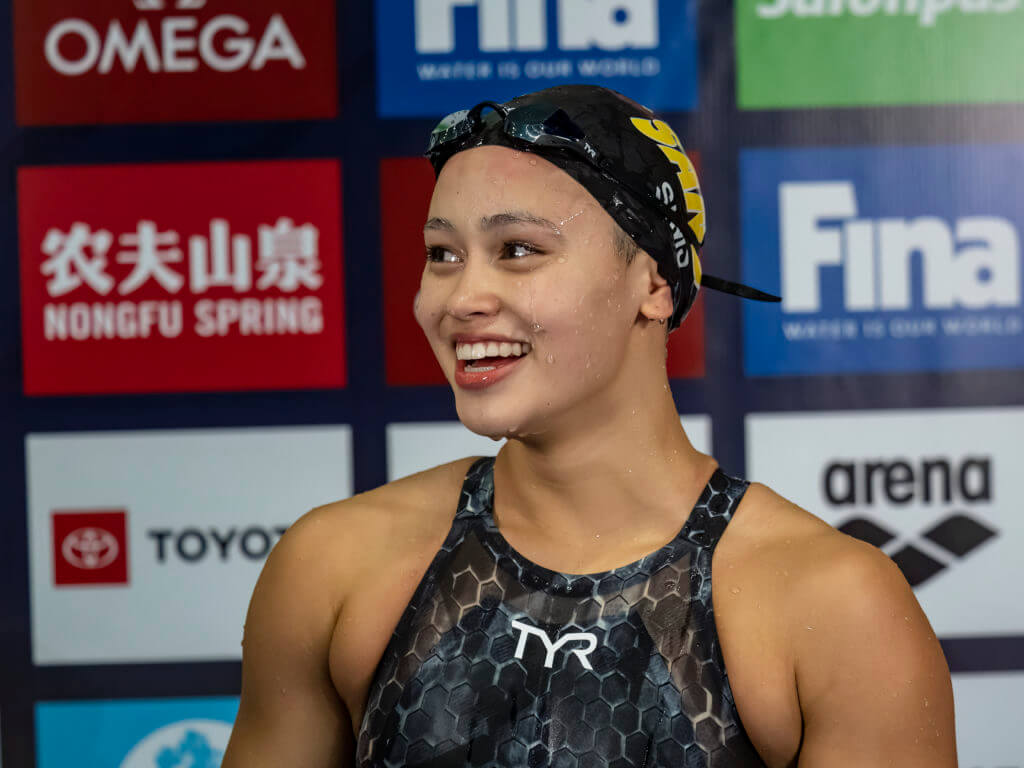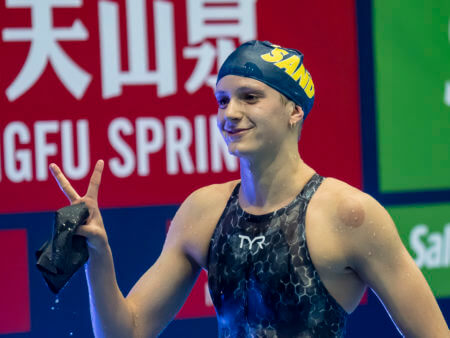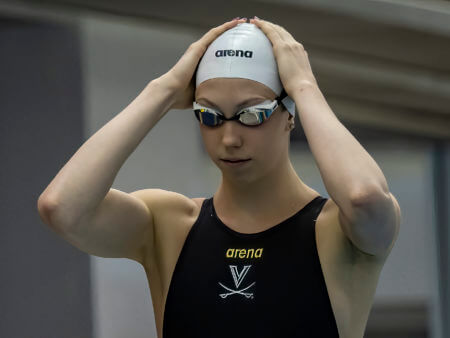Bella Sims, Katie Grimes Lead Promising Weekend for Future of U.S. Women’s Team

Bella Sims, Katie Grimes Lead Promising Weekend for Future of U.S. Women’s Team
It was a really good weekend to be a fan of U.S. women’s swimming. Not a lot of landscape-shuffling swims take place in November, but at meets across the country, swimmers lauded for their potential inched further toward international contention. A pair of swimmers racing at the FINA World Cup in Indianapolis etched their names onto record books while performances in so-called off-events evoked the question of “really?” Meanwhile, at a college dual meet in Austin, Texas, a different set of records got a scare as one of the best stretch of early-season NCAA performances in recent memory continued.
There was Bella Sims, an Olympian at age 16 and a silver medalist in Tokyo for her efforts in a prelims relay but surely overshadowed by Sandpipers of Nevada teammates Erica Sullivan, Katie Grimes and Claire Weinstein. Sims has never qualified to represent the U.S. at a major meet in an individual event, but she earned her way onto the finals squad for the 800 freestyle relay at the World Championships and excelled. She took a lead provided by Katie Ledecky and expanded it on the way to a surprising U.S. gold.
The results that Sims achieved at the World Cup foreshadow her spot in the pecking order of American middle-distance freestyle continuing to rise. Sims finished second in the 400 free in Indianapolis, well ahead of fellow American teens Erin Gemmell, Weinstein and Grimes, and in the 200 free, she placed fourth behind the elite trio of Siobhan Haughey, Ledecky and Madison Wilson, finishing less than a half-second behind Ledecky. Her mark of 1:52.59 was good for a world junior record, and Sims, 17, got to keep the mark by holding off Canadian teenage world champion Summer McIntosh by four hundredths.
McIntosh swam a relay leadoff at Worlds that would have been quick enough to win gold in the individual 200 free. Sure, short course is not equivalent to long course, but the idea that Sims is on McIntosh’s level in the 200-meter race? Unexpected.
But her swim in the 100 backstroke? That’s simply out of nowhere. Sims had never raced short course meters before Indianapolis, but her best times in the 100 back were 1:01.33 in long course and 53.26 in short course yards, solid but not even national-final level. Well, a mere 12 minutes after the 200 free final, she posted a short course meters time of 55.75. She broke another world junior record, climbed onto the all-time top-15 list and left short course backstroke specialists Beata Nelson and Ingrid Wilm as well as multi-time world champion Kylie Masse in her wake.
Where did that come from? And is there now a new contender among Americans in the 100 back? It’s already among the deepest events in the country after Regan Smith and Claire Curzan won gold and bronze, respectively, at the World Championships and a host of other big names (Rhyan White, Katharine Berkoff and Olivia Smoliga, among others) did not qualify.
Sims then ended the weekend with another pair of quick times in events she would never before have been associated with: 2:01.64 in the 200 back and 2:06.90 in the 200 IM.

Katie Grimes — Photo Courtesy: Peter H. Bick
As for Grimes, she has already reached that top-level individual success on the international stage, with silver medals in the 1500 free and 400 IM at Worlds. She was really solid in her main events in Indianapolis, most notably with her world junior record of 15:42.05 in the 1500 free. That does not exactly scream “peak performance” since it was less than three seconds off her long course time from June, but again, it’s November, not exactly a normal time for peak performance. The 16-year-old Grimes had to pull a grueling double Friday as she returned hours after her 60 laps of racing to contest the 400 IM, where she placed second.
But it was her swims in her less-established events that deserve the most attention. Less than 30 minutes after racing the 400 free, she swam a time of 2:04.16 for second place in the 200 butterfly. She did not let McIntosh, the long course world champion in the event, get more than a second ahead. It was a similar story in the 200 back as Grimes blasted ahead of Masse on the last 50 to take third place behind Nelson and Sims with a mark of 2:02.34.
When Grimes qualified for the 2021 U.S. Olympic team as one of the biggest surprises of the Olympic Trials, distance freestyle looked like her forte, and within the next year, she was already the best 400 IMer in the country. But 200 back and 200 fly? Just like Sims, here is another teenager from Nevada with talent in potentially a lot more events than we previously realized.
But enough about the World Cup. How about the clash between the two top women’s college teams in the country, Virginia and Texas. The Longhorn women upset the two-time defending national-champion Cavaliers (largely thanks to an ill-timed relay disqualification), and those who followed Lydia Jacoby’s unlikely path to Olympic gold in the 100 breaststroke will undoubtedly be encouraged by the 18-year-old’s start to her college career. But the top individual performer of the meet was Gretchen Walsh, a 19-year-old on a ridiculous tear this year.
At her first NCAA Championships, Walsh won one individual national title and finished second twice while helping UVA to four relay wins and the team title. Missing the World Championships team was a setback for sure, but she produced elite times at U.S. Nationals in late July to show that her long course skills did not lag far behind her short course speed. But through Virginia’s early-season meets, Walsh has been lights-out without even dipping into her swim bag for a tech suit.

Gretchen Walsh — Photo Courtesy: Peter H. Bick
Against Texas, that meant swimming a 50-yard free time of 21.16, which would have been good enough for third at last year’s NCAA Championships, as well as a 46.20 relay split for the 100 free and one of the fastest times ever in the 100 IM. That’s on top of previous sterling butterfly efforts that included the fastest 50-yard fly split ever and a 50.53 100 fly that is the quickest time in the nation in a loaded event.
Virginia will be racing at the Tennessee Invitational in two weeks. Walsh actually missed that meet a year ago because of health issues, but this time, American records have to be on the table. With even minimal rest and a tech suit, the results might be historic.
All that in one weekend, a three-day stretch of racing with enough fast times to add to an already-accomplished basket of riches for a U.S. team aiming for the Paris Olympics less than two years away. In Tokyo, the American women won only three gold medals, but the team seemed poised for jump in the ensuing shortened cycle with 10 teenagers already representing the Stars and Stripes. That has panned out as swimmers such as Torri Huske and Alex Walsh became individual world champions in 2022, and Sims, Grimes and the younger Walsh sister are among those joining into the surge.



